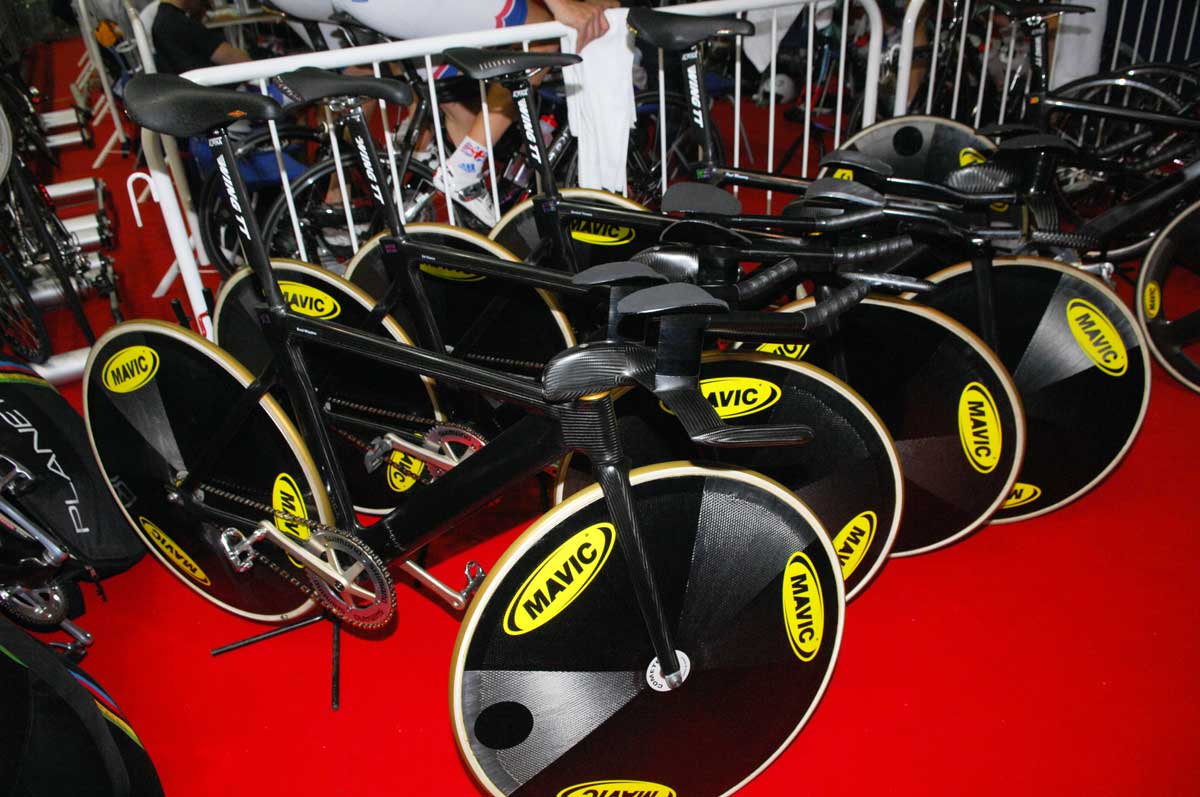British track bikes available for sale: Price tbc


Want to ride the same bike as Sir Chris Hoy, Victoria Pendleton and Britain's team pursuit heroes? Well, now you can.
Great Britain's track bikes are made specifically for the team, but to come in line with the technical regulations of the sports governing body, the Union Cycliste International (UCI) and its Lugano Charter, British Cycling has now made them available for sale.
All the teams track and road frames, along with forks, handlebars and helmets are available for sale through the UK Sport website.
Each item of equipment is listed, and an email address is given for any interested parties. There is however no mention of price, and a line confirming that as the kit is made by hand, and to order, the ‘lead time from order to delivery can sometimes be long.'
British track cyclists first rode the UK Sports Institute (UKSI) bikes in 2002. They were designed and built by former Greek track sprinter Dimitris Katsanis who studied composite engineering after retiring from competitive cycling. Katsanis is one of the key members of the famed Secret Squirrel club led by Chris Boardman.
Over the years the club has looked at every piece of equipment and clothing in a bid to give British cyclists an edge. Since the Beijing Olympic cycle they have focused predominantly on aerodynamics as the frame design that Katsanis first produced has stood the test of time.
But the domination of the British cycling team on the track at the Beijing Olympics made the UCI nervous. They were only too aware of the considerable budget at the disposal of the British team, and although they never admitted it, the sight of one team winning everything does little for their ‘Globalisation of the Sport' mantra.
The latest race content, interviews, features, reviews and expert buying guides, direct to your inbox!
The 2008 bikes and equipment were of course within all the technical regulations that govern bike design: There was a triangular frame, it was above the weight limit and all aspects were within the 3:1 ratio.
But the UCI had an old rule up their sleeve - the Lugano Charter. In fact it was less a rule more a philosophy. Released on October 8, 1996 it said: ‘Being aware of the potential dangers and problems posed by the loss of control over the technical aspects of cycling, the UCI Management Committee has today taken a number of measures.'
‘The UCI wishes to recall that the real meaning of cycle sport is to bring riders together to compete on an equal footing and thereby decide which of them is physically the best.'
It continues....... ‘The bicycle serves to express the effort of the cyclist, but there is more to it than that. The Bicycle is also a historical phenomenon, and it is this history which underpins the whole culture behind the technical object.'
Technical innovations within cycling had gathered pace through the 1990's. Pioneering Scotsman Graeme Obree had reinvented the riding position not once but twice, and equipment like Spinaci bars (minature tri bar extensions that were used in road races) and four-spoke, carbon fibre Spynergy wheels had flooded the peloton.
Although Obree had developed his two positions, and the bikes that allowed him to ride in those positions, in his garage, the UCI was worried that other developments were driven by the sports more powerful players, allowing those with a big budget to gain an advantage.
Hence the Lugano charter. The problem was, they had no real way of enforcing such rules. Whether or not a rider is allowed to start a race on the bike they arrive at the start line is down to the discretion of the race commissaire on the day.
It's easy to spot a rider with a set of tri bar extensions and tell them to take them off, but how does a commissaire know if a bit of equipment was built in the spirit of the Lugano charter?
The philosophy was all but ignored until 2008. But in the wake of the British success on the track everyone, media and other nations, started to look at the equipment the Brits were using.
The black UKSI frames were old news, but the winged bars, and new helmets and skinsuits caught peoples eyes. Of course it was too late to do anything retrospectively, so the UCI sprung in to action the week of the 2010 track world championships in Copenhagen.
They wrote to all nations reminding them that all their equipment must be in-line with their principles that bikes ‘must be marketed (i.e. available for sale on the market). And that prototypes and use of equipment specially designed for a particular athlete, event or performance is prohibited.'
It wasn't just the British who were riding specific equipment. The German teams had been riding their own FES (a bespoke carbon manufacturer) bikes for years, and the Australians had previously developed special handlebars for Cameron Meyer.
But still there were no clear guidelines to enforce the Lugano Charter. Then at the end of the year the UCI published their Approval Protocol for frames and forks. This said that all new frames and forks would have to be approved by the UCI before use in competition as of January 1, 2011.
The protocol would not affect bikes already in production, just new ones. It set the industry in a tail-spin, and the UCI, realising the size of the task they had set both the industry and themselves, relaxed some of the time frames and the costs they were to charge the frame builders.
A year-and-a-half later and all bikes ridden in competition now have the UCI sticker on them, and many manufacturers applied for backdated approval on pre 2011 frames to ensure clarity. Many manufacturers slowly embraced the idea as it promoted the fact that potential purchasers were indeed buying the exact same bike they watched being ridden to victory in the Tour de France and spring classics.
It did however prove somewhat problematic for British Cycling's Secret Squirrel club as the bikes were always made for the British team, with good reason too. Production line track bikes are basic machines as companies R&D budget goes in to the more lucrative road market.
Neither are the frames available in your local bike shop built to harness the powers of Sir Chris Hoy and the like. The UKSI bikes were designed with these factors in mind, but it's hard to deny that the pre-Beijing aerodynamic research crossed the line and gave them a significant edge.
So before the London Olympics Chris Boardman took every piece of equipment and clothing to the UCI's headquarters in Aigle, Switzerland to have them signed off by Julien Carron, the UCI's technical coordinator.
Boardman admitted earlier in the year what a big task that had become, but it was better than the prospect of a commissaire in the track centre turning round minutes before an Olympic final and stopping a rider from competing.
Despite the effort, and the stickers on the bikes all the necessary paperwork is in the track centre.

Editor of Cycling Weekly magazine, Simon has been working at the title since 2001. He first fell in love with cycling in 1989 when watching the Tour de France on Channel 4, started racing in 1995 and in 2000 he spent one season racing in Belgium. During his time at CW (and Cycle Sport magazine) he has written product reviews, fitness features, pro interviews, race coverage and news. He has covered the Tour de France more times than he can remember along with the 2008 and 2012 Olympic Games and many other international and UK domestic races. He became the 134-year-old magazine's 13th editor in 2015 and can still be seen riding bikes around the lanes of Surrey, Sussex and Kent. Albeit a bit slower than before.